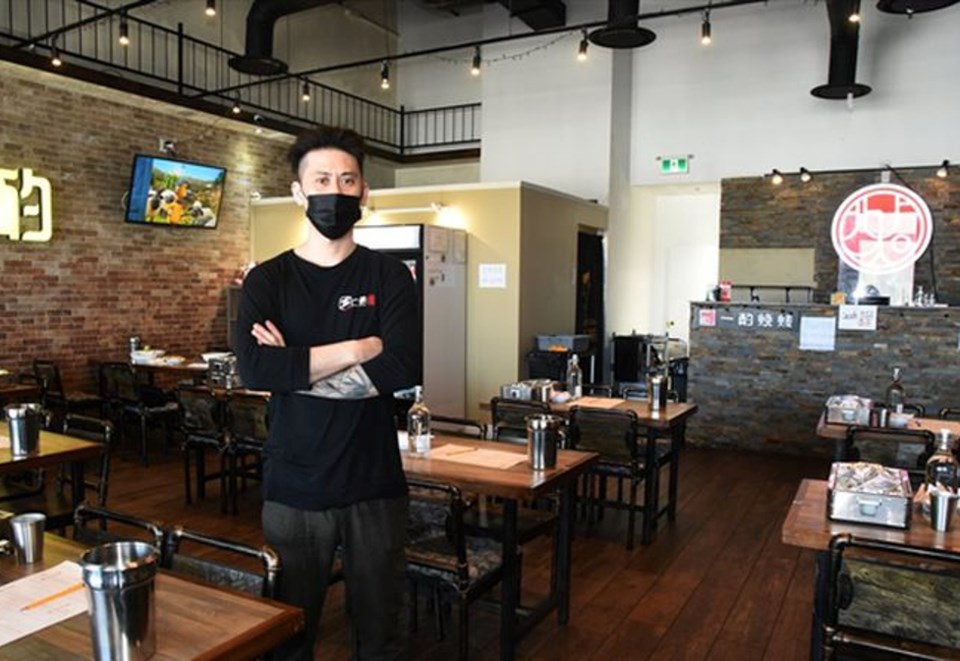The variety of outdoor activities during the summer has fuelled enthusiasm for dining out, which has driven many restaurants in Markham to a peak after two years of disruption by the pandemic, but the booming business has also brought a worrying problem — a shortage of labour.
According to the latest statistics from Statistics Canada, in the first quarter of 2022, the number of vacant jobs in the accommodation and food services sector was up 88 per cent compared with the same quarter of 2020. The food services and drinking places subsector accounted for 92.4 per cent of the overall increase in job vacancies in the sector.
One Shot BBQ at First Markham Place opened January 2020. “It has been not easy for us to hold on till now," said owner Richard Liu.
He added that the cost of hiring people in the post-pandemic era is so high that has left him no choice but to take on several jobs in the restaurant.
Andy Liu, manager of Amazing Seafood near Unionville, said running his business is more mentally exhausting these days because he has to look at the faces of the kitchen staff every day, in fear they will quit at any time.
“We have very few young back-of-house workers in our restaurant,” said Andy, adding it’s becoming more common to hire a helper at a high price that breaks the market rule, weekly salary from $900 to $1,300, which makes owners complain a lot.
"Before the pandemic, Andy added that recruitment wasn't as difficult as it is now. Many foreign workers would work steadfastly in order to obtain their status.
Now, Andy believes that permanent residency in Canada was no longer attractive to many people due to various reasons that immigrants are reluctant to come.
For most Chinese restaurants, they need workers who can use Chinese as a working language and who are preferably familiar with Chinese food culture.
Carrie Wu, immigration consultant from Keero Immigration Consulting Inc. in Markham, observed that Chinese students seldom came to Canada to study cooking. They prefer to major in IT, accounting or business under their parents' influence.
As for recruiting overseas workers, there's the Ontario Immigration Nominee Program (ONIP), designed to assist employers fill their labour market needs. There's also the Labour Market Impact Assessment (LMIA), which is a document that an employer in Canada may need to get before hiring a foreign worker."
However, in addition to the processing time varying between one and six months, these two options also have specific requirements for employers.
For example, an employer's business must have a minimum of $1 million in total gross annual revenue in Greater Toronto Area (GTA), including York Region, for the most recently completed fiscal year. It also must have at least five full-time employees who are Canadian citizens or permanent residents.
A positive LMIA needs employers to show that no Canadian worker or permanent resident is available to do the job as well.
Despite the urgent need for workers to keep restaurants running day-to-day, Richard said the Ontario and federal government's attempts aren't working for him.
"We are a small business, and we simply can't afford to spend that time and energy going through a lengthy process to recruit workers overseas."
"The government is making historic investments in innovative programs that help employers, job seekers and workers," stated Ciara Nardelli, media spokesperson at the Ontario Ministry of Labour, Training and Skills Development, “A new program has been proposed to provide 600 job seekers with training, mentorship and job placements with local employers in baking, food science, and food production and processing."
That said, not everyone believes these measures are the right answer.
For Andy, knowing Chinese is a minimum threshold to hire people. As a Hong Kong-style dim sum restaurant, their ordering machine is mainly in Chinese, and upgrading the system is tedious and unfriendly to older employees.
Scarlett Liu is a federally funded Local Journalism Initiative reporter at Markham Economist & Sun



